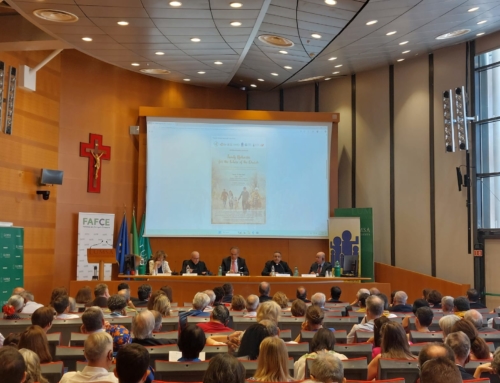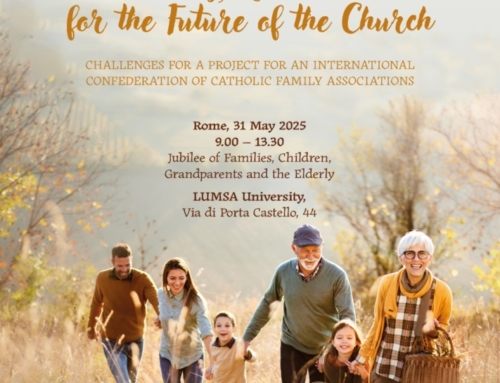23 April 2021
On 21 April 2021, FAFCE contributed to the European Commission’s public consultation on the Green Paper on Ageing (click to download: FAFCE Contribution Green Paper on Ageing Questionnaire). The European Commission had invited stakeholders and the public to provide their views on the process of ageing to anticipate, prepare for, and respond to ageing in the EU. Everybody is a stakeholder in ensuring that the European Union is well positioned to meet the needs of its population at every stage of life. As the Commission itself notes, the ageing of the European Union’s population presents both challenges and opportunities. FAFCE’s contribution spoke to both of these dimensions while framing the issue within the context of families and intergenerational solidarity. This contribution builds upon the publication of the COMECE-FAFCE Joint Reflection Paper on The Elderly and the Future of Europe, presented in a webinar last month.
This public consultation took the form of a questionnaire that addressed many dimensions of ageing, from increasing life expectancy to improving the participation of the elderly in the labor market to developing the prospects of rural and remote areas. FAFCE highlighted the interconnectedness of these concerns and centered its contribution on the unique capacity of families to create cross-cutting solutions to exigencies that all stem from the same problem of weakened families and relations between generations.
The question on ageing and the depopulation of rural areas typifies this situation. In its contribution, FAFCE notes that “Ageing by itself is not a risk to rural areas. The problem arises with depopulation, when young persons leave rural areas and the elderly are left on their own. Thus, the best way to fight ageing in rural areas is to create job opportunities for youth that sustain the family and mixed-generation living arrangements.” On this issue, the EU does not have to reinvent the wheel by attempting to relocate people to rural and remote areas or somehow slowing the ageing process, that is to say, practically if not biologically. Instead, the EU can combat the depopulation of rural and remote areas by weakening the factors that cause young people to leave such areas and the factors that keep them from coming back. The problem, then, is not that people are ageing too quickly but that certain areas are adapting to the needs of families too slowly.
As the European Parliament stressed recently in its Report on general guidelines for the preparation of the 2022 Budget, “sustainable and long-term solutions must be found to successfully fight structural demographic challenges, as well as to mitigate brain drain in rural, insular, remote and less developed areas and regions of the EU; emphasises the need for financial resources to revitalise regions suffering from population decline through investments in social and demographic policies that support families and to provide ageing populations in Europe with adequate support in terms of access to healthcare, mobility and public services”. The family is at the center of all these proposals and the EU’s strategy must keep it there.
The same principle applies to the acute problem of old-age poverty. Certain policies can indeed protect the financial situation of the elderly, either through prevention or in reaction to existing cases. Examples of such measures that FAFCE suggests are, among others, the inclusion of child-rearing and care work responsibilities in the calculation of pensions or a program guaranteeing universal minimum revenue for those in situations of extreme old-age poverty. However, certain situations in early and middle age plant the seeds of poverty in old age, and policies must thus address this fact. Indeed, the financial situation of the family, more often than not, determines the situation of its members. As a result, the EU’s approach to old age poverty must begin in the family. FAFCE’s contribution draws out this causual link: “Family is the first protection against poverty through intergenerational solidarity. If the family is trapped in a situation of poverty, it produces a domino effect that affects all its members. To fight this “poverty trap”, families should be recognised in their crucial role in the community, especially through a just taxation system.” Other articles (see below) contain a fuller treatment of the tax issue and its impact on families, but in the context of sustainable ageing it suffices to say that unjust systems of taxation do not end with the fiscal year; rather, they reverberate into old age and sometimes curdle into the sad fact of poverty in old age.
This questionnaire is an important step in contributing to the drafting of the possible policy responses that will be proposed by the European Commission’s public consultation. Ageing is a complicated concern that presents a host of overlapping social problems. However, in the pursuit of high-level solutions, EU policymakers cannot afford not to acknowledge first principles. Of these, the very first is the preeminence of the family in shaping the direction of one’s life. As FAFCE’s contribution states, “It is a simple question of subsidiarity. Families are the first respondents to the needs of older relatives.”
· · ·
FAFCE Articles That Reference Taxation:
[1] International Day of the Family 2020
[2] Press Release: Bucharest International Seminar For A Renewed Family Policy
[4] Decreasing Birth Rates in Europe: Is It Really the Choice of Parents?







